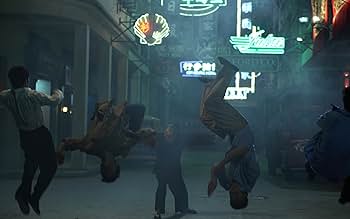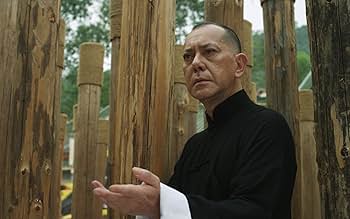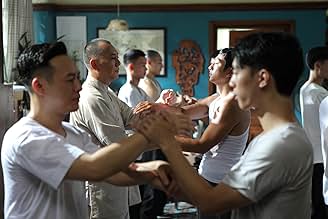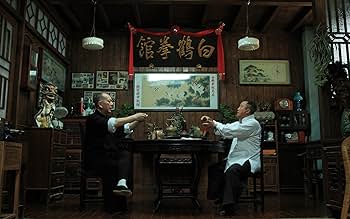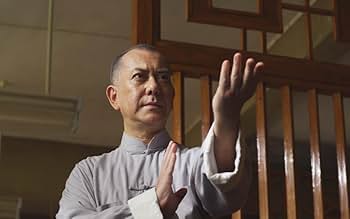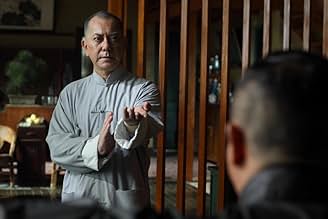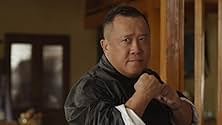Agrega una trama en tu idiomaIn postwar Hong Kong, legendary Wing Chun grandmaster Ip Man is reluctantly called into action once more, when what begin as simple challenges from rival kung fu styles soon draw him into th... Leer todoIn postwar Hong Kong, legendary Wing Chun grandmaster Ip Man is reluctantly called into action once more, when what begin as simple challenges from rival kung fu styles soon draw him into the dark and dangerous underworld of the Triads. Now, to defend life and honor, he has no ch... Leer todoIn postwar Hong Kong, legendary Wing Chun grandmaster Ip Man is reluctantly called into action once more, when what begin as simple challenges from rival kung fu styles soon draw him into the dark and dangerous underworld of the Triads. Now, to defend life and honor, he has no choice but to fight one last time ...
- Dirección
- Guionista
- Elenco
- Premios
- 4 premios ganados y 7 nominaciones en total
- Jenny
- (as Zhou Chuchu)
- Local Dragon
- (as Xin Xin Xiong)
- Ngai Tong
- (as Jonathan Wong)
- Dirección
- Guionista
- Todo el elenco y el equipo
- Producción, taquilla y más en IMDbPro
Opiniones destacadas
Set against the big commercial movie cog machine and the Ip Man franchise, the majority of Yau-Wong penchant for grittiness is diluted and only some of it remains in Ip Man: The Final Fight. It is that essence of the grittier and the uglier sides of Ip Man that makes out for the more interesting parts in Ip Man: The Final Fight, but it's also the film's major weakness because it never treads far enough from familiar territory.
What the film ends up being more like tonally is a combination of the Wilson Yip- Donnie Yen Ip Man films and Bruce Lee My Brother, where it is loosely glossing over the details of the grandmaster's life and dramatically punching up the action so it can allow for fight scenes, but also providing a retro-gaze of Hong Kong accompanied with a celebrity guest-list cameos.
For example, it's been said that Ip Man sported an opium habit. The concept is telegraphed but never truly explored. Another example is Hong Kong actor Liu Kai Chi gives a cameo as Ip Man's friend who is suffering from poverty. They start what might be a potentially interesting storyline but it never finishes itself. Much of the film is like that.
There are about several subplots running through the story and they all end up as separate vignettes that do not rise above the sum of it's parts. For a biopic drama, that's a problem because it does not provide an unified narrative goal. This is not an editing issue. The story was based on Ip Chun's stories of his father and it is as if seemed like the screenwriter noted them down as told and the director literally shot them that way. So I attribute this issue to lazy writing. The retroactive voice-over device ends up killing a lot of the drama. The scene will be happening and the voice-over will cut in summing up the rest of the scene in past tense. It keeps glossing over by stating what happened instead of letting the audience experience what's happening in the now.
Anthony Wong is very natural as Ip Man. He looks most like the real-life version of Ip Man and actually adopts a Foshan accent. He breathes many colors into the role and the scenes with Ip Man and his students is the heart of the film. Anthony Wong is pretty much the best thing about this movie and his performance alone is the price of admission.
Eric Tsang has a great supporting role as a Crane style master who befriends Ip Man. There is a self-referential joke where Tsang says being a 'clan master' (獎門人) is difficult, a reference to his famous television game show, that was self-serving and unnecessary. Tsang and Wong share an awesome fight together. Not a lot of people remember that Eric Tsang started out as a stuntman; the fight looks very authentic. They were really smashing their forearms together. Eric Tsang is a badass.
Something I noticed about the cinematography was there were way too many crane shots in this film. There's a scene that ends on a connective moment between two characters and then it cuts to a crane shot backing away presenting a view of the entire rooftop set. I have a theory about this. In Hong Kong, booking a crane from a production house is a planned expense and usually you would require more crew members or more time to set up a crane shot. Production houses in the Mainland will give crews an entire film equipment package in their deals, which includes cranes and jibs. With the cheap labor and higher amount of crew members, a crane shot can be set up much faster in the Mainland. As a recent occurrence, a lot of Chinese productions lead by Hong Kong directors have recently been very crane shot-heavy. Hong Kong directors, this needs to stop. You have to remember to pull back every once and a while.
Just as a small footnote, I really hated the Bruce Lee cameo. Playing Bruce Lee in a film is by no means an easy feat but the actor they chose was abysmally awful. He made Bruce Lee look like a rich asshole sellout. It was not fun, nor did it work as a pop culture reference.
Overall, I enjoyed this film, but I do not think it works completely as a standalone piece. It seems to fit as the final piece to this whole line of Ip Man films. In a way, I can't help it because they've made so many movies about Ip Man in such a short time.
With every film, I see a little more of who this man was, what his legacy was and it had me thinking about even what being a good teacher means. I still think The Grandmaster is the best Ip Man film. They really don't need to make any more Ip Man movies. And if they do (and I think they are because I saw a poster for an Ip Man 3 with Donnie Yen), please do the story with Bruce Lee and get him right.
For more reviews, please visit my blog at http://hkauteur.wordpress.com/
The surprise is of course Yau teaming up with his one time iconic collaborator Anthony Wong, who together have made classical Category III films in The Untold Story and Ebola Syndrome. Here, they reunite to bring a kung fu master to life, and a biographical one at that, and going by the trailers, Wong is no pushover as he executes the Wing Chun moves with grace and ferocity, with little that betrays the use of a stuntperson or wires to help make his a lot more graceful. What works here in the fight department is the awesome choreography that does justice to both the martial arts and the actor, obviously having trained for it, to execute the moves with as much authenticity as possible.
Action sequences may be limited in quantity given Herman Yau's and Erica Lee's story focused on the more dramatic moments, and relationships that Ip Man has with his wife (Anita Yuen), a songstress (Zhou Chu Chu) and his many disciples, but more than made up for it in terms of quality. Cinematography in action films are key in either wanting to play the cheat sheet with quick cuts and edits, with either faraway or tight shots to hide the stuntperson, but this one is done perfectly well to show off the cast members' moves and intensity of their blows, and does its action choreography justice, which for a martial arts film, matters most. Besides some speeding up detected, it doesn't have over the top style, but kept things as simple as Wing Chun's philosophy, and that battle between Ip Man and Master Ng (Eric Tsang) remains one of the best in this movie, and dare I mention also ranks as one of the best amongst the rest of the Ip Man films put together.
If there's a downside to this, it's the issue of having too many characters jam packed into this less than two hour story. There's a whole host of disciples that Ip Man had recruited, and while screen time is dedicated to these characters, their development was fleeting at best. Headlining the disciples were the likes of Gillian Chung chalking up her resume in her recent comeback, but her role was rote at best, with her relatively less well known stars given more screen time instead. Jordan Chan is the other famous headliner for the film, starring as Ip Man's disciple and a policeman, caught up with moral issues as his profession brings about opportunities for corruption at the time, and how he struggled with this moral dilemma. But it's not much of a struggle as it turned out, although the narrative steered clear on passing any judgement or ending on the character, except to remind that he was an important source of income to keep things going. Zhou Chu Chu as the songstress provided a promise of a romance that wasn't much, but this love story has its shades in Wong Kar-Wai's epic in being a love that could have been, told in a very different fashion here.
The opening film of this year's Hong Kong International Film Festival, with that territory comes a certain guarantee that this has to live up to its honor with high production values, which was a plus point as the 50s and 60s Hong Kong got recreated both in terms of external sets and interior art direction and production to transport the audience into an era long gone. Giving it some artistic credibility is how the narrative blended with the history of Hong Kong as a background, making it as much of a historical epic of the colony at the time as it is about the story of Ip Man's advancing years in life. Still, as part of the Ip Man movie canon, The Final Fight has its moments, and even if you're jaded from too many films about the grandmaster in such a short duration of time, this movie still has what it takes to offer audiences a different aspect yet to be seen of Ip Man, with its Wing Chun moves and fights being the icing on the cake. Recommended!
The movie isn't going to be spectacular as Ip Man or Ip Man 2. You already know it from the cast. But it was good in its own ways because Anthony Wong's portrayal of the master was kind of spot on. Life in Hong Kong wasn't so easy in the '50s or '60s, and being an old man in that environment would have been hard even for a grand master of his caliber. The story integrates both Ip Man and Hong Kong pretty well. If there's a problem with this movie, story didn't flow as smoothly as it could have been, but finding story in Ip Man's old age probably wasn't so easy.
I would accept this movie as Ip Man 3. I don't know how good the real Ip Man 3 is going to be, but without Donnie Yen in the starring role, I'm sure it wouldn't have the high tension previous two movies had. As many have commented, this rush to capitalize on the Ip Man's popularity is getting to be passé. This movie was acceptable as the swan song to the saga of Ip Man.
Not only do you have two fine (mature) actors opposite/side-to-side, you also have a story that is told. A story that tries to show us, that violence is not key. Don't worry though, there is plenty of great action scenes in it. It actually heightens those scenes, when you have something solid in between them, that makes you wait for them
¿Sabías que…?
- TriviaIp Man's son, Ip Chun, makes a short cameo in the movie. Appearing when Ip Man was telephoned about his wife died.
- ErroresWhen Ip Man arrives in Hong Kong in 1949, a Volkswagen Type 2 (aka Camper or Minibus) passes in front of him on the street. The first Type 2's were not produced until mid-November 1949 and the vehicle was not available for sale until 1950.
- ConexionesFollows Ip Man - Nace la Leyenda (2010)
- Bandas sonorasPing Shui Xiang Feng
Composed by Yao Nin
Lyrics by Yang Yan Qi
Sung by Wu Ying Yin
[OP: EMI Music Publishing Hong Kong
License courtesy of EMI Music Hong Kong, admin by Warner Music Hong Kong Ltd]
Selecciones populares
- How long is Ip Man: The Final Fight?Con tecnología de Alexa
Detalles
Taquilla
- Total en EE. UU. y Canadá
- USD 37,884
- Fin de semana de estreno en EE. UU. y Canadá
- USD 15,514
- 22 sep 2013
- Total a nivel mundial
- USD 3,967,001
- Tiempo de ejecución1 hora 40 minutos
- Color
- Mezcla de sonido
- Relación de aspecto
- 2.35 : 1
Contribuir a esta página





